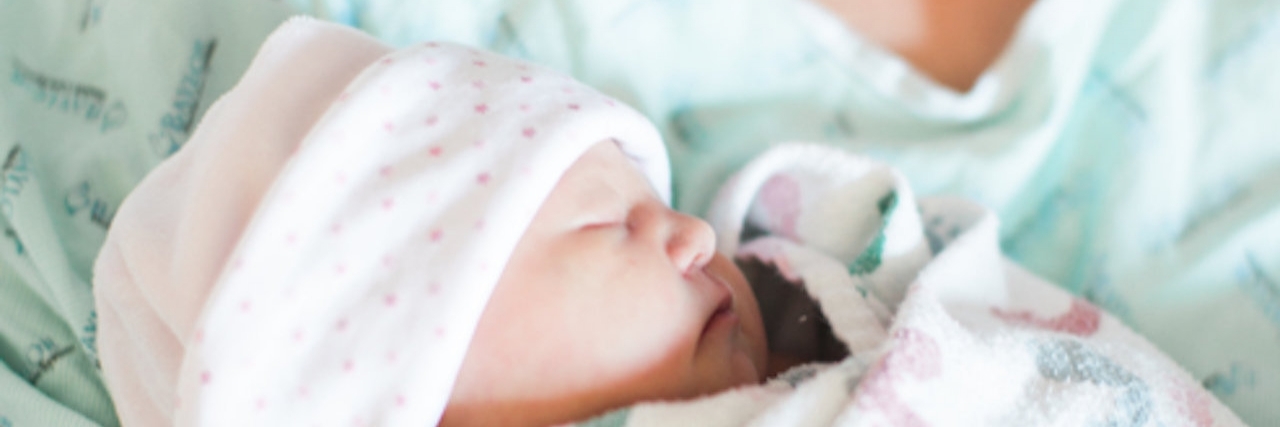The first thing I Googled after learning prenatally our daughter had screened positive for Down syndrome was whether or not she would be able to breastfeed. I scoured the internet for any hopeful stories I could find. Instead, I was met with article after article that listed the many challenges babies with Down syndrome face. Overall, the outlook for breastfeeding seemed bleak.
Still, even in the absence of great assurance, the desire to breastfeed remained strong in my heart.
My daughter Alisa’s birth story would be considered, to some, a rather unremarkable birth. Due to complications with the placenta, I had been hospitalized for the last eight weeks of my pregnancy. When it was time to deliver, my obstetrician induced me in hopes of a vaginal delivery. In the end, though, Alisa’s heart didn’t tolerate my contractions, and a C-section was needed. Upon delivery, we met a beautiful baby girl who was all wrapped up in her umbilical cord, which explained the dips in her heart rate during contractions.
In the recovery room, my family and I marveled at Alisa. This child we had long anticipated and prayed over was now in our arms, and she was beautiful. In my groggy postpartum state, the question now pounded in my mind with fresh intensity: Will she breastfeed? The nurse came to help me, and though we tried tirelessly, Alisa just would not latch well.
“Let’s take a break and try again later,” the nurse assured me. And as kind as that nurse was, I heard for the first time in her words a tone I would hear frequently in the coming days and weeks: doubt.
The first week of Alisa’s life was very intense. Alisa was whisked away to the NICU due to fluid retention in her lungs, which was a complication from the C-section. During our stay in the NICU, I became increasingly irritated with the phrase, “Well, with Down syndrome babies…” whenever medical staff would answer my questions.
Slowly but surely, I realized they were treating Alisa for her diagnosis of Down syndrome, even though that wasn’t the reason she had been admitted to the NICU. I also realized the greatest challenge Alisa would face in life was not her own limitations, but simply the low expectations of others.
So I advocated for my daughter. In the absence of any true medical reason that would prevent her from breastfeeding safely, I stubbornly insisted on breastfeeding her. I worked with a compassionate lactation consultant who encouraged me greatly, even as I wept.
I spoke with the head neonatologist, who in the end recognized their biases and apologized for the low expectations they had placed on my daughter. He confessed they had only been treating her through the lens of Down syndrome, and he then gave us the time and opportunities we needed to learn to breastfeed.
We left the hospital six days after Alisa was born, and together, Alisa and I were exclusively breastfeeding. She had no NG tube; she had no need for bottles. We worked closely with her pediatrician, who monitored her weight and gave me the encouragement I needed. “Keep doing what you’re doing,” he would say, and with the support of family and friends, we did just that.
Eight months later, Alisa is still exclusively breastfed and gaining weight like a champ. And Alisa Jane, my little overcomer, has showed me that perhaps we, meaning the outside world possessing many prejudices and doubts, are possibly the greatest obstacle children with Down syndrome will ever face.
To the internet, which is often filled with such bleak and disheartening news for parents, I would like to offer this story of hope. Babies with Down syndrome can breastfeed. I have met many other mothers who also breastfeed their babies with Down syndrome. Like us, some were able to do so right away, while others had to first address medical complications such as heart defects before they went on to successfully breastfeed their babies.
As I mentioned at the beginning, my first question when I learned of her diagnosis was whether or not my baby could breastfeed. They can do it; Alisa has taught me that.
The real question, though, is this: Will we let them?
Follow this journey on Chasing Genuine.
Imagine someone Googling how to help you cope with your (or a loved one’s) diagnosis. Write the article you’d want them to find. If you’d like to participate, please check out our Submit a Story page for more about our submission guidelines.

